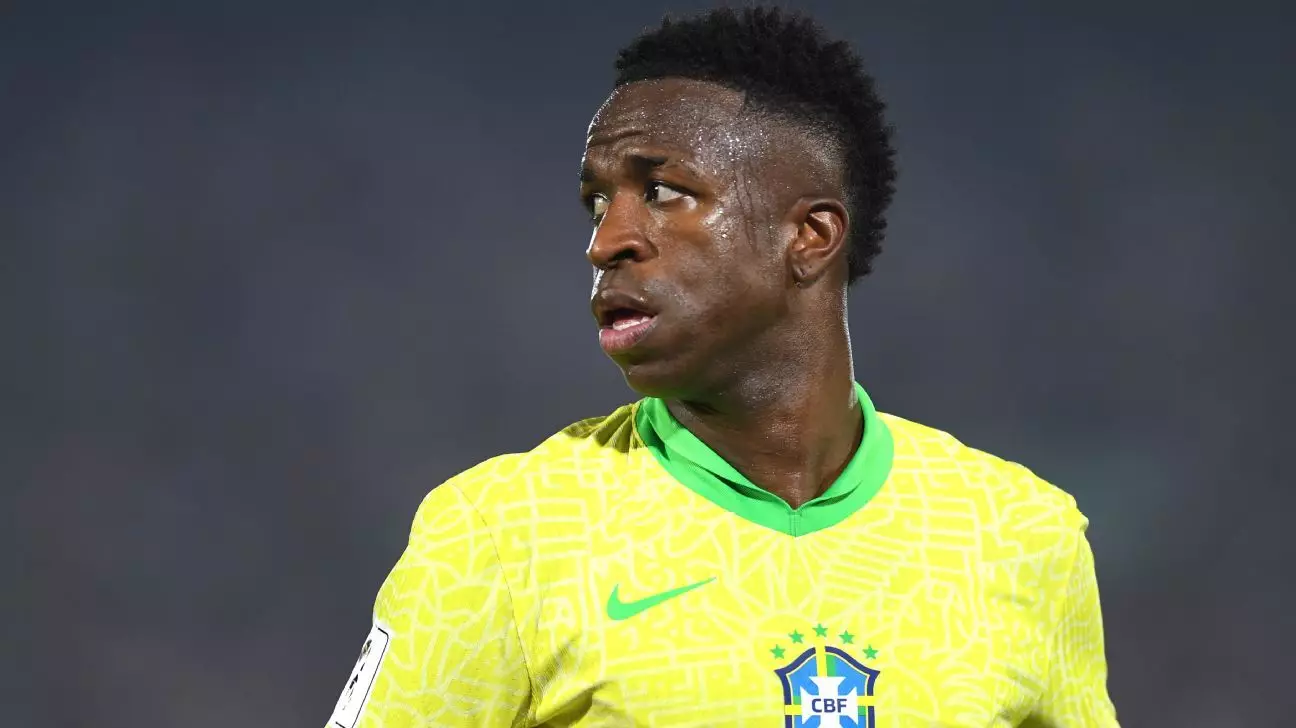Vinícius Júnior’s profound disappointment after Brazil’s staggering 4-1 defeat at the hands of Argentina during the World Cup qualifier is hard to ignore. Capturing the essence of the match at the Monumental stadium, the young star lamented the team’s dismal performance, signifying a crucial turning point in Brazilian football’s ongoing narrative. In a game where they managed only a single shot on target, Brazil’s woes were magnified under the spotlight of a rival nation dominating in both skill and strategy.
The result wasn’t just a loss; it was a wake-up call. Coming off a string of inconsistent performances, Júnior’s assertion that “everyone did badly” sends shockwaves through the ranks. With a World Cup looming a year away, Brazil’s national team stands at a crossroads—faced with the need for introspection and drastic change if they hope to reclaim their historical glory.
Analyzing the Pressure and Expectations
Brazilian football carries with it the weight of immense expectations fueled by a storied history of success on the world stage. This match against Argentina exposed the vulnerabilities within the squad, leaving them a staggering ten points behind their rivals in South American qualifying. Vinícius’s comment that “the people want us to win” not only reflects the sentiments of an anxious fanbase but also underscores the immense pressure players face when donning the iconic yellow jersey.
The young forward proposed a fundamental reevaluation of their approach, urging teammates to build on the progress made during initial qualifying rounds while also shedding outdated habits. The upcoming challenges require not merely tactical adjustments but a comprehensive realignment of mindset, resilience, and unity.
Lessons from Argentina’s Dominance
Vinícius credited Argentina’s longstanding continuity as a pivotal factor in their success. Their chemistry, cultivated through years of collaboration, allowed them to exploit Brazil’s weaknesses effectively. This reality starkly contrasts Brazil’s current struggles, highlighting a crucial lesson: excellence in football doesn’t come merely from individual talent but from cohesive teamwork that thrives under pressure.
The confidence that stems from winning the last World Cup is palpable; Argentina’s players stepped onto the field with a belief that Brazil seemed to lack. This stark difference in mentality during high-stakes moments is what Júnior flagged to emphasize the need for Brazil not only to find their style but to earn back the trust of their supporters.
Understanding the Role of Media and Rivalry
In the lead-up to the clash, comments from Raphinha sparked a firestorm of debate, showcasing how media narratives can influence on-field performance. Strategically, Raphinha’s brash words intended to instill fear into their opponents may have backfired, serving as motivation for a resilient Argentina squad. Julián Álvarez highlighted how such statements added “flavour” to this historic rivalry, demonstrating how psychological aspects play into the dynamics of such intense fixtures.
This brings us to the broader question of whether vocal bravado helps or hinders athletes. Emiliano Martínez’s critique of pre-match chatter resonates—actions on the pitch speak louder than words. For Brazil, perhaps it’s time to evolve from boastful comments to actionable, demonstrable performance that reasserts their place in the world of football.
The Accountability and Future of Brazilian Football
Dorival Júnior finds himself in the precarious position of being the head coach during this challenging period for Brazil. His admission of full responsibility for the lackluster display against Argentina shows a commitment to accountability, but the urgency for transformation cannot be overstated. In every defeat lies the opportunity for resurgence, and Júnior has pledged to turn this ship around, yet action speaks louder than intent.
In light of growing pressure and swirling speculation regarding Carlo Ancelotti’s potential appointment, the question arises: How much longer will the CBF continue to support Júnior? The transition from Tite’s tenure has left a void that needs filling, but whether Júnior is the right man for the job in facilitating that growth remains a topic of heated debate.
As Brazil looks ahead to their next World Cup qualifiers against Ecuador and Paraguay, there lies both challenge and opportunity. Navigating this tumultuous landscape will require more than mere reshuffling; it necessitates a renewed philosophy that channels the indomitable spirit historically associated with Brazilian football—a spirit willing to confront adversity head-on, rooted in pride but focused on progress.

